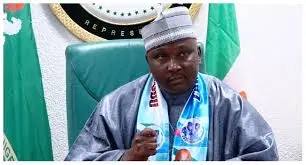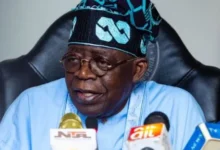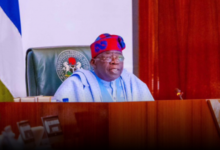Why poverty will remain with us —Doguwa, longest serving northern lawmaker

In Nigeria’s dynamic political landscape, only a few have withstood the test of time, influence, and public scrutiny like Rep. Alhassan Ado Doguwa. A towering figure in the legislative arm of government, Rep. Doguwa’s parliamentary journey is as compelling as it is historic.
Currently the longest serving northern member in the House of Representatives from Kano state, he began his legislative career in the Third Republic in 1992, earning his place among Nigeria’s longest-standing lawmakers. Known for his fiery eloquence, deep institutional memory, and unwavering loyalty to his constituents, Doguwa has served in various capacities, including Chief Whip and House Leader, shaping critical national debates and legislation. Rep Doguwa hardly grants interviews as he is a silent worker who avoids the limelight.
In this exclusive interview with Saturday Vanguard, Rep. Doguwa reflects on his decades-long journey in the National Assembly, the trials and triumphs of his political career, and his enduring commitment to Nigeria’s democratic development. Being a northerner who should know, he believes the culture of his people is responsible for the level of their poverty which he says will remain. He argues that as long as their religion, tradition and culture permit the menfolk to marry four wives, the problems associated with high population will continue to stare them in the face. His story is not just that of a politician—but also of resilience, faith, and unwavering service. Excerpts:
What do you think has been the cause of the high rate of poverty and insecurity in the north, despite their political dominance, and what should be done to arrest these problems?
I think to be very frank with you, and to my own understanding, the major cause is our own social culture and our tradition. And you know, changing tradition is a difficult thing. You look at me now, I’m married to four wives, and you know what that means in terms of responsibility. Thank God I’m comfortable. Probably my salary or my allowances could help me sustain my family. But what of other people who have the same four or five wives but may not be doing quite well financially? So, it is all about our tradition.
For as long as my religion allows me and allows other people to marry four wives, and they continue to reproduce, the population factor will be there. When the culture does not stop it, tradition does not stop it and religion does not stop it, then, the high population in the north will continue to be our problem. And I’m telling you, I can’t help it. I’m still happy with my four wives and I’m still producing, I’m still counting. Nobody will stop me. And I believe my other brothers in the north will not stop.
So for as long as we continue with the tradition and the culture, then our problem of having great serious economic inequality amongst our ranks will persist.
The level of poverty will also continue to be there, even though my religion tells me nobody is responsible for poverty except God. You cannot be impoverished by a colleague, you cannot impoverish me, I cannot do the same to you. So, if I’m rich, it’s from God, if it’s otherwise, it’s from God. That is the belief we have and you know, changing this kind of tradition or values is a difficult one. So we just continue in this way, hoping that the same God that we serve will give us the opportunity to prosper. Since God allows me to marry four wives, I now look up to God to provide for me to be able to take care of my four wives and the children. So it’s not something that you can simply offer a solution and say except we do this, we cannot get this or except we stop this, we cannot achieve this. These are things that are completely under the concept of tradition, religion and culture. So that’s just my understanding. There may be some efforts that have been made by the government.
For instance, the setting up of the elementary schools or special initiatives by the government to address the impoverished and the less-to-do people. These are interventions that will help one way or the other. But I don’t see such interventions being proactive enough to simply get the problem out of our midst. So for me, it is like a spiritual thing but we will continue to look up to God to make us prosper. And on the issue of insecurity, it is sad that our people are not involved in gainful employment. And the moment they have an opportunity to partake in illegal engagements, you find them readily available for that. So if governments at the state and the local government levels can create opportunities for the young men to be gainfully employed, then the security challenge will definitely reduce.
What initiative have you supported or proposed to empower women and youths in your constituency? How can more young people participate meaningfully in politics and governance?
We are not members of the executive arm of government, we are only members representing our people. If you look at the basic terms of our constitutional position as legislators, we are not even supposed to embark upon projects or empowerment. But because of the nature of our own democracy as a developing one, you can see how members have now compelled themselves into taking up duties and responsibilities of the executive.
So many things are being done not only by myself, but by all the members, because there is one big vacuum that we have to fill. And without the existence of the National Assembly members, I tell you, most of our constituencies, especially the agrarian constituents, those in the villages, not those from Lagos and Badagry who may have a lot of other windows to support their people, would not have enjoyed any development in this democracy.
So we do a lot of things such as empowerment programmes. Sometimes we initiate what we call capacity building among our people. We also offer them small loan schemes and sometimes offer them grants so that they can engage in some petty businesses to sustain themselves. We are doing a lot of things for our people, I can see that zeal amongst our members, especially in the 10th Assembly, coming up with a lot of initiatives to see how they can impact upon the lives and livelihood of our young men and women. The government too is helping through a special ministry for humanitarian affairs, to address some of these issues relating to our youth and to also help the women in doing one thing or the other to support them.
Some of the programs and policies of the government today are also geared towards addressing some of these problems. There are the student loans bills, we also have the development commissions that are being set up across the federation. We used to have only a few of them in a few areas, but the President found it necessary to now create such commissions across the federation which will help in tackling some of the peculiar challenges we have in different zones.
With increasing economic challenges in Nigeria, what legislative solution do you think can be proposed?
Of course, there are various challenges, ranging from the economic crisis to the issue of insecurity and creating an enabling environment for petty, medium, and even large-scale businesses to actually thrive, so that our young men can be gainfully engaged in businesses.
These are some of the initiatives which I think are under consideration, and I think the 10th Assembly is doing its best in addressing some of these issues. Security is the first and foremost, because you have to secure the society first before any other thing can work. And you will agree with me that the security situation is epileptic. Today it may get better and tomorrow it may get worse.
So I think the 10th House of Representatives should get on its feet, to see how we can come up with legislations, resolutions, and some kind of legislative guidance for the government to observe, so that our security issues and challenges can be addressed once and for all. One major thing the House or the National Assembly as an institution can do about insecurity is basically on funding. So for as long as we finance security agencies to the best of their expectations, I don’t think any of the security agencies had any issue with any one of us right from day one. Whatever comes in for security, we consider it as a no-go area.
We have always granted it graciously, because we believe no amount of money could be too much for the security and lives of the people. So for as long as we have granted that in the budgets, then no security agent or agency or head of any security will have any excuse.
The best we can do is to finance them and we have financed them. Sometimes they come up with a lot of supplementary requests, and we have always granted that.
For the National Assembly today, I think we have done our own dues, it is now left for the executive arm of government to ensure compliance in terms of the expenditure of the funds we have provided. We may have what you call the oversight right, we oversee what we have provided for them.
But we have a limit, because we don’t have an official line of instructions to the agencies. Official line of instructions or communications lies in the hands of the chief executive or the executive arm of government. And the executive arm of government must help the National Assembly to ensure that the funds that we have provided in the budget are being utilized judiciously and to the expectation and the service of our people.
Sometimes we find out that some of the provisions we make in the budget for those who are in the war front do not get to them and they are crying out that they are not paid their daily allowances and that they feed only once in a day. These are some of the outcries we receive from our people in the front line.
So some of these things have to be checked by the government. We have relevant committees on security in the House who may have a role to play, but there is a limit to what they can do. So, as far as the National Assembly is concerned, we have done what we are expected to do, and if there is any problem anywhere, it has to be a problem of supervision from the executive arm of government or from those arms or components of such security agencies that are supposed to ensure such things are done.
Talking about your time as the leader of the house in the 9th Assembly, can you share with us what were the key lessons and challenges during your tenure? What are your biggest legislative achievements to date?
I was the number three man in the House of Representatives of the ninth assembly when Hon Femi Gbajabiamila was the Speaker of the House. In those days I always took pride in the fact that we had the right man on the seat. Femi knew his onions and I can tell you till today, Femi would be my best Speaker.
Of all the years that I’ve been on the floor of the House of Representatives till today, I will tell you that I have not seen any Speaker that had performed excellently as Femi did. He was an institutional person.
He was someone who would want to come up with a lot of milestones. Look at the state library, the National Assembly Library which he created. Look at the e-parliament we have on the floor, the use of online voting, online procedure on the floor of the house. All these were brought about by Femi Bajabiamila.
So that is my number one experience as house leader, that I was leading a house with Femi Gbajabiamila as the Speaker. Femi wanted to be the Speaker, he was prepared for it and he had the potential to be the Speaker.
It’s one of the things that I keep to myself that yes, I have served under a worthy leader who knew his job. I can beat my chest today to tell you that for me he is the best speaker I have ever worked with, either as a floor member or as a presiding officer. Secondly, if you look at some of the legislation, don’t mind the number of bills that people may be parading in some other assemblies. Are we mere producers of bills or quality legislations that were not only popular in terms of supporting the people of the country but which added real value good governance? I think Femi’s house, the ninth House of Representative, also under my watch as leader, did the best, I can tell you. We had so much legislation; the student loans bill, the bills that were enacted to check insecurity problems in the country. We also had the bills that we enacted to actually establish some supervisory agencies over our security agencies. Remember also the kind of proactive budgetary legislation that we have done.
At all times, our legislations on budgets, money bills, have always been not only proactive, but have also been pro-public, devoting significant chunks of our resources to address education, insecurity, and agriculture. You know, some people don’t even know that budgets are also laws. Budgets are legislations. So most of those budgetary legislations that we passed under my watch as House Leader were budgets that had to do with core concerns of the people of the country to actually redeem our economy and to redeem the value of our Naira. This government is doing its best. The problems the present government inherited started a long time ago. In fact I can give the present government a pass mark in the way it has handled the challenges it inherited.
I want to believe that if Nigerians continue to be patient with this president, not only in his second term, even within the remaining two years of his first term, so many wonders will be performed. People will see miracles, the kind of miracles we saw in Lagos when he was governor. My belief is that with someone who is a realistic person as our leader, someone who is very practical and very bold and brave to do the right thing, no matter what, like Tinubu I think we are building not only a renewed hope for Nigeria, we are also building a renewed Nigeria. And Nigeria will continue to be the envy of all African states and even beyond. I have no doubt in my mind that Tinubu will be victorious in the 2027 general election. He will even perform better than he did in the last election.
What is your assessment of the 10th National Assembly performance so far?
When you look at the 10th Assembly independently, it is one assembly that you can commend, for peaceful coexistence and stability in the house. Members have that kind of sense of working together with the speaker who is very humble. This is one thing that is also quite unprecedented. The Speaker of the 10th House of Representative Rt. Hon. Abass Tajudeen is not only humble but he is also patient with an uncommon ability to descend to the level of the ordinary members and operate on the same page with them.
Speaker TJ is a very good example of the modest principle of “First amongst equals” in the House. Speaker Tajudeen is also an exemplary leader that extols the greatest virtues of parliamentary diplomacy. He is indeed very diplomatic in his leadership style. A clear example of this was his approach to the Tax reforms Bills’ debate and subsequent passage of the bills that almost tore the House apart. He kept being patient, but focused.
He consulted virtually all relevant stakeholders until when he was sure everyone was on the same page. He finally brought the bills to the floor at a time when nobody was opposed to it. Such is what we call legislative or parliamentary diplomacy. Indeed, Speaker Tajudeen never believed in the presumed powers of the gavel. He believes every single person’s opinion is important.
You’ve been a prominent figure in the House for many years now. How will you describe your journey in the National Assembly?
This is a very big and intriguing question, especially for someone who has faith in Islam, believes in Allah and the messenger of God.





